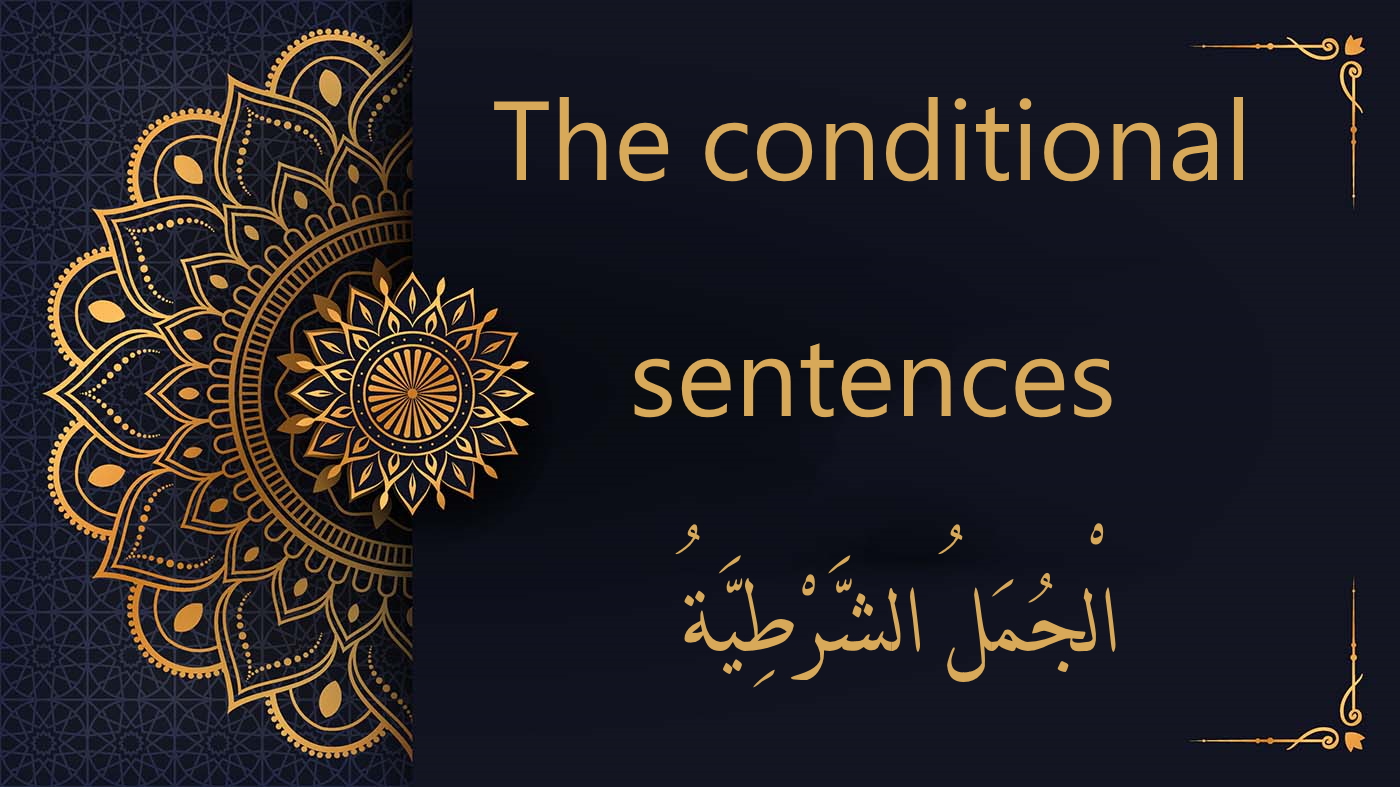
In Arabic grammar, conditional sentences are composed of two primary components: the condition itself, termed the protasis or فِعْلُ الشَّرْطِ, and the consequence or result of that condition, known as the apodosis or جَوَابُ الشَّرْطِ.
In many cases, especially within verbal sentences, both the protasis and the apodosis can utilize verbs that are in the perfect (or past) tense or in the jussive mood. This interplay of verb moods and tenses is pivotal in conveying the exact nuance and implication of the condition being presented.
For instance, consider the sentence: إِذَا جَاءَ النَّصْرُ فَسَبِّحْ (When the victory comes, then glorify [God]). Here, “إِذَا جَاءَ النَّصْرُ” serves as the protasis, denoting the condition of the victory arriving. In contrast, “فَسَبِّحْ” is the apodosis, highlighting the subsequent action or consequence of glorifying God when that condition is met. The choice of verb forms in such sentences is crucial in understanding and interpreting the relationship between the condition and its outcome.
يَا أَيُّهَا الَّذِينَ آمَنُوا إِن تَنصُرُوا اللَّـهَ يَنصُرْكُمْ وَيُثَبِّتْ أَقْدَامَكُمْ
O you who have believed, if you support Allah, He will support you and plant your feet firmly. (47:7)
In Arabic, conditional sentences are typically introduced by specific particles that set the tone for the condition being presented. Here are some of the primary particles used:
وَإِن تَعُودُوا نَعُدْ
but if you return [to war], We will return (8:19)
When the particle لَ precedes إِنْ, it adds emphasis, translating to “indeed if” or “certainly if.” This combination strengthens the condition, indicating a heightened sense of certainty or emphasis on the hypothetical scenario presented.
لَئِن لَّمْ تَنتَهِ لَأَرْجُمَنَّكَ ۖ وَاهْجُرْنِي مَلِيًّا
If you do not desist, I will surely stone you, so avoid me a prolonged time.” (19:46)
وَلَئِن لَّمْ يَفْعَلْ مَا آمُرُهُ لَيُسْجَنَنَّ وَلَيَكُونًا مِّنَ الصَّاغِرِينَ
and if he will not do what I order him, he will surely be imprisoned and will be of those debased.” (12:32)
Note: When إِنْ is followed by إلَّا, it functions as a negation, translating to “none but” or “none except.
إِنْ هُوَ إِلَّا وَحْيٌ يُوحَىٰ
It is not, but a revelation revealed, (53:4)
In probable conditional sentences, both the protasis (فِعْلُ الشَّرْطِ) and the apodosis (جَوَابُ الشَّرْطِ) can be in the perfect or jussive mood.
فَإِذَا جَاءَ الْخَوْفُ رَأَيْتَهُمْ يَنظُرُونَ إِلَيْكَ
And when fear comes, you see them looking at you (33:19)
فَإِذَا ذَهَبَ الْخَوْفُ سَلَقُوكُم بِأَلْسِنَةٍ
But when fear departs, they lash you with sharp tongues, indisposed toward [any] good. (33:19)
وَلَوْ شَاءَ رَبُّكَ لَجَعَلَ النَّاسَ أُمَّةً وَاحِدَةً
And if your Lord had willed, He could have made humanity one community (11:118)
لَوْ أَنزَلْنَا هَـٰذَا الْقُرْآنَ عَلَىٰ جَبَلٍ لَّرَأَيْتَهُ خَاشِعًا مُّتَصَدِّعًا مِّنْ خَشْيَةِ اللَّـهِ
If We had sent down this Qur’an upon a mountain, you would have seen it humbled and coming apart from fear of Allah (59:21)
A hypothetical negative condition is typically conveyed using لَوْ لَا, which translates to ‘if not’ or ‘had not’.
وَلَوْلَا أَن كَتَبَ اللَّـهُ عَلَيْهِمُ الْجَلَاءَ لَعَذَّبَهُمْ فِي الدُّنْيَا
And if not that Allah had decreed for them evacuation, He would have punished them in [this] world (59:3)
وَلَوْلَا دَفْعُ اللَّـهِ النَّاسَ بَعْضَهُم بِبَعْضٍ
And if it were not for Allah checking [some] people using others (2:251)
وَإِنْ أَرَدتُّمُ اسْتِبْدَالَ زَوْجٍ مَّكَانَ زَوْجٍ
But if you want to replace one wife (4:20)
وَإِن تُصِبْهُمْ سَيِّئَةٌ يَقُولُوا هَـٰذِهِ مِنْ عِندِكَ ۚ قُلْ كُلٌّ مِّنْ عِندِ اللَّـهِ
and if evil befalls them, they say, “This is from you.” Say, “All [things] are from Allah.” (7:78)
فَمَن يَعْمَلْ مِثْقَالَ ذَرَّةٍ خَيْرًا يَرَهُ
So whoever does an atom’s weight of good will see it, (99:7)
وَمَن يَكْفُرْ بِهِ فَأُولَـٰئِكَ هُمُ الْخَاسِرُونَ
And whoever disbelieves in it – it is they who are the losers. (2:121)
مَن يَعْمَلْ سُوءًا يُجْزَ بِهِ
Whoever does a wrong will be recompensed for it (4:123)
فَلَمَّا جَهَّزَهُم بِجَهَازِهِمْ
So when he had furnished them with their supplies (12:70)
This lesson on Arabic nuances concludes here. Insha’Allah, our subsequent session will delve into the Inna and its sisters in Arabic.
Al-dirassa Institute invites you on a linguistic journey with our expert teachers to master the Arabic language. Should you wish to further your studies, we welcome your inquiries.
Discover the experiences of our delighted clients who have thoroughly enjoyed utilizing this standout feature.
Alhamdulillah I‘m very pleased with the arabic and Qur’an lessons I receive from teacher Umm Tasneem and I‘m also content with the al-dirassa administration team who were very quick in answering any questions I had. In a month I progressed a lot and I cannot wait to continue my studies with al-dirassa. May Allah reward everyone at al-dirassa.
Verified review - view original
My Qur’an teacher is fantastic, she teaches me in a loving and kind way where I look forward to the lessons and learn so much. My Arabic teacher is equally as nice and has a lot of patience with me, she has great expertise in the field and I’ve progressed really quickly with her. Thank you Al-dirassa!
Verified review - view original
Don’t want to go through the translation anymore?
30 free minutes with your qualified Egyptian teacher.

Al-dirassa Institute offers you a gift to help you begin your journey to being fluent in Arabic and learning the Quran.

Al-dirassa Institute offers you a gift to help you begin your journey to being fluent in Arabic and learning the Quran.